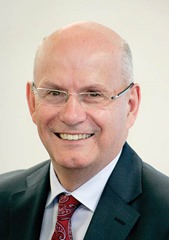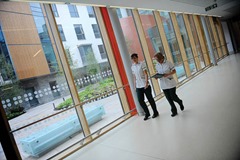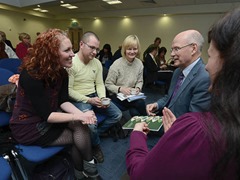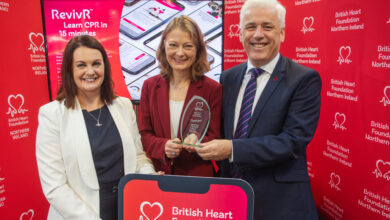Changing the system
 John Compton shares his reflections about his term as the first Health and Social Care Board Chief Executive with Peter Cheney, including the importance of good communication.
John Compton shares his reflections about his term as the first Health and Social Care Board Chief Executive with Peter Cheney, including the importance of good communication.
John Compton is retiring after five years as Chief Executive of the Health and Social Care Board. The new post was created to oversee the province’s system when the Review of Public Administration took effect in 2009. The board arranges or ‘commissions’ health and social care services for the whole population of Northern Ireland (1.8 million people) and has an annual budget of around £4 billion.
Services are then mainly delivered by the five geographic health and social care trusts, the Ambulance Service, 352 GP practices and 520 pharmacies and dental practices. Transforming Your Care foresees a greater role for the voluntary and private sectors – and a shift from providing services in hospitals to providing them in or closer to home.
Compton chaired the original Transforming Your Care review which was commissioned by Minister Edwin Poots in June 2011 and reported in December of that year.
Almost three years on, John Compton sums up progress as “pretty significant.” He adds: “I know that there are many people in the population who will say: ‘Are things really different?’ And I guess whenever there are things that are different, you don’t always experience them because they become your norm.”
The integrated care partnerships are helping to improve primary care; 17 have now been set up. He’s also pleased to see a range of community-based projects for patients with chronic obstructive pulmonary disorder and other respiratory conditions. Many people are now “experiencing care in a very different way” and this change will “accelerate” over the next two years.
In hospital services, primary percutaneous coronary intervention has been introduced in Belfast and will be rolled out in Derry by the summer. This involves taking a heart attack patient straight to a cath lab to widen the artery, clear the blockage and immediately have a stent inserted to improve blood flow.
Northern Ireland is “very much on target” for having no people with a psychiatric condition resident in a hospital by 2015. Two new inpatient units have now been opened and planning is underway for a further four sites. This will mean a facility in each of the five trust areas as well as a second unit in the Western area.
In terms of care for older people at home, the reablement service is now “fully operational” in three commissioning areas and will be rolled out province-wide by the summer. Reablement aims to stop people from becoming dependent unnecessarily or prematurely on health and social care services.
Family nurse partnerships, which support young parents aged 19 and under, are currently available in the Southern, Belfast and Western areas and are to be extended elsewhere by April 2015.
There’s “a lot of change” happening in the system, Compton remarks, although he sometimes thinks that change “gets confused with the debate about efficiency” which is about how to make the best use of those services.
“Transforming Your Care and the language of Transforming Your Care is now part of everyday language for political representatives, for professionals, and for the population [and] for the press. When it’s understood in that way, you understand that you’ve made that change.”
As for room for improvement, timing stands out as frustration.
“You always want to accelerate the change,” Compton relates. “People want to see it, they want to feel it, they want to touch it and so there’s always this momentum and this pressure to do it quicker and quicker.”
The difficulty is the health and social care system is trying to do this while running a service at the same time. He senses that the impetus and energy in the change process has been “accelerating” since it got under way 12 months ago.
Taking a longer view, he notes that health and social care “is just unrecognisable from when I first started” i.e. as a trainee social worker in 1973. “The really exciting thing about working in health and social care is that it’s never static. It’s always changing and I think the pace of change, with the technology that we have, will take it to another plateau in another 10 or 15 years.”
In particular, Compton highlights genotechnology – the ability to understand how a person’s genes predict illnesses or disabilities. “We’re on the cusp of something really very radical in terms of being able to identify and do a lot of preventative work for people,” Compton explains.
Communication
The constant big issue is to make sure that the service has a “proper connection” with the public that it serves. “It’s very easy to sometimes adopt the position of ‘I know best’ and that always leads, I think, to failure and to difficulty and to complexity,” he remarks. This increases the importance of communicating “very effectively with the population [on] what you’re trying to do and why you’re trying to do it.”
Compton finds that the vast majority of the population know that the health and social care workforce is trying to provide a good service and they want to understand it, be involved and feel that they have a say in how it is being developed.
“It doesn’t mean a veto but it does mean a say,” he emphasises. “Any health and social care system must remain connected to the population it serves.”
Northern Ireland has a “fantastic” system despite of all the difficulties and “all of the adversity that’s sometimes in the press.” It boasts “really, really committed staff” and about one in five citizens has a close family connection to someone who works in health and social care.
As of March last year, the system employed 66,061 people: 9.5 per cent of employees in the province.
“We really do have a truly skilled, able workforce,” he reaffirms. “And that’s so important when you’re trying to deliver good care.”
 Asked for any advice he would give to a manager who is starting out, Compton replies: “It’s a tremendous job. It’s difficult. Don’t expect it to be easy. Don’t lose sight of what the thing’s about.”
Asked for any advice he would give to a manager who is starting out, Compton replies: “It’s a tremendous job. It’s difficult. Don’t expect it to be easy. Don’t lose sight of what the thing’s about.”
The service is about “the person who’s receiving the care and treatment” and it’s always important to understand that “the decisions that you take have a material effect on people that you sometimes don’t know but they have a very personal effect on them.” Managers therefore need to value what they do and how they do their job.
Despite its complexity, Compton still enthuses about the discipline: “It’s a great job. You meet fantastic people. You do something that has real value and I think it’s a very worthwhile career and I would urge anybody who thinks that it’s for them to very much have a go at the job.”
He continues: “The truth of the matter is if you don’t enjoy what you do, you don’t do it well. Of course, there are times when it’s very pressured and it’s very difficult and stressful but ultimately I’ve always enjoyed the job.”
On some days, he has wished that “it was tomorrow rather than today” but without an underlying sense of enjoyment “you can’t bring energy and you can’t bring enthusiasm and you can’t bring motivation to people who are working the system.”
Profile: John Compton CBE
John Compton qualified in social work in 1976 after graduating from Queen’s University Belfast and worked in a number of posts across Lisburn and Belfast. He co-ordinated the social work response for Northern Ireland during the Kegworth air disaster in 1989.
After holding senior social care posts in the Eastern Health and Social Service Board, he worked in management in the Down Lisburn Health and Social Services Trust (1990-2006). He was then Chief Executive of the South Eastern Health and Social Care Trust (2006-2009) before taking up his current role. Outside work, he is a family man and has played and refereed rugby at a senior level as well as completing several long distance running events and marathons. John was awarded a CBE in the 2013 Queen’s birthday honours list for services to healthcare in Northern Ireland.






